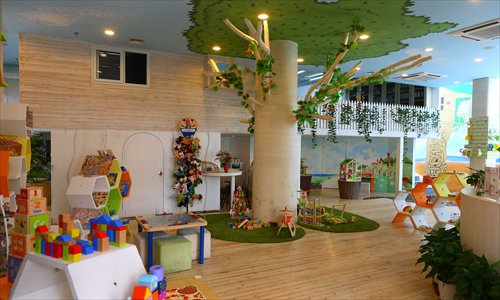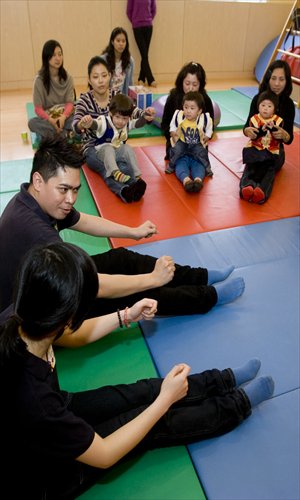The race to teach the toddlers

Shanghai parents with an eye to their children's futures are now pushing toddlers into early education centers to give them a head start in life. Once private coaching for high school students was considered the ultimate in extra education but now, on the day a baby is born, parents are enrolling the infant in an early education center.
Shanghai had over 400 private early education centers registered by 2012. The toddler tutors promise to give the child the head start in education that every parent dreams of. It can cost up to 200 yuan ($32.19) an hour but young parents are now vying for places for their newborns at these centers.
Meeting the demand are some wily businessmen who see education as a marketable commodity - even if sometimes the actual centers themselves lack trained staff or proper curriculums. Centers can offer to teach children from the age of 2 years or so art, music, drawing, English and the Shanghai dialect. Some even offer MBA-style courses.
According to the Jiefang Daily, Shanghai now has 19 government early education centers. These offer regular classes and charge fees. There are also 736 government-backed programs, which offer toddlers six free classes every year. Enrollments are from local children but if there are spare places, children from other districts or without a Shanghai hukou (household registration) can be admitted. The teachers at these centers have certificates from the Shanghai Municipal Education Commission and there are no more than 13 children in a class.
A chaotic industry
In January, Chen Lei, a city policy advisor and the head of the China Welfare Institute Nursery, was pushing for stricter supervision over the often chaotic private early childhood education industry.
Chen has 25 years' experience in early childhood education and believes that while properly-informed childhood education is definitely a good supplement for home education, amateur or untrained education could actually harm a child's development.
With a fast growing population, the demand for professional early childhood education centers is huge. Shanghai has welcomed 600,000 new babies since 2010. When public centers are not enough, a large number of private centers have been opened to meet the market demands.
The private centers, many established simply as moneymakers, have been flourishing and expanding without curbs. Staff may be unqualified and some centers have closed suddenly, leaving parents who have paid their fees in advance, in the lurch. Chen said that it was important to identify which government department was going to be responsible for supervising private centers. "They shouldn't be left alone simply because the regulations are not clear.
"At present, most private centers are registered with the Shanghai Administration for Industry and Commerce as ordinary businesses with no mention of education in their applications. They apply for their licenses as toy suppliers or consultants and provide the education services under the counter. If they wanted to be registered as education businesses, they need permission from the local education authorities which set high standards for teacher qualifications, the amount of space needed and the curriculum - things that private centers cannot provide," Chen said.
Ni Minjing is an early childhood education official with the Shanghai Municipal Education Commission. He told the Global Times that private centers should be overseen by the government department that licensed them. If they were not registered with the education commission, commission officials could not deal with them.
Chen suggested that the Shanghai Municipal Education Commission should take the major responsibility for private early education centers and work with the city's industry and commerce authorities, the civil affairs and the pricing authorities to thoroughly examine the applications and daily operation of the centers.
Chen told the Global Times that some government departments had confirmed they would in the future be stricter about awarding licenses and supervising their running.
The Shanghai Administration for Industry and Commerce noted in its annual report in February that it would monitor private centers more closely and would not extend licenses for companies that were offering educational services under the counter.
Support sought
Some of the private centers are also calling for the centers to be better supervised and to have higher standards. Further still, they want government support. Zhou Jing and her partners set up a private early childhood education center five years ago. She acknowledged that there were problems in the industry, but she said that most of the teachers and staff she knew and worked with were well-intentioned and eager to provide professional education.
"But it's very difficult to hire teachers with the appropriate education levels because most suitable college graduates prefer to work in government kindergartens which offer steady and well-paid employment. Many private centers don't spend enough in training new teachers and improving facilities because this costs too much and they haven't the cash. I know from personal experience that my center can only barely make a profit if we take in 200 children every month."
Zhou said that centers like her own could not register as education providers with the Shanghai Administration for Industry and Commerce even if they wanted to because there was no such classification listed there and it was nearly impossible to be registered with the education commission. "Most preschool centers have to register as consultants."
Zhou suggested that the government subsidize private early childhood education centers. "This way the government wouldn't need to spend money building new centers for itself. It could subsidize companies like ours. For instance, for a class charging 160 yuan, the government could shoulder some and a family would only have to pay the rest 80-120 yuan. With this sort of help, the private centers would be able to attract more children, and make sufficient money to train staff properly and improve the quality of their services."

Parents warned
With more new parents paying for early childhood education, experts are warning that they should know exactly what they are buying and avoid being manipulated by salesmen.
Chen told parents: "Don't just focus on specialized courses like reading, writing and playing the piano. Life and nature are the best study materials. It's more important to teach an infant basic living skills and help them form good habits and personalities."
Some young parents are aware of the problems and look for centers where their children can learn to communicate with others, practice art or music or just enjoy games.
Lu is a 31-year-old human resources specialist with a two-and-a-half-year-old girl, who goes to a government early childhood education center three mornings a week and to a private center from time to time. "I paid for the enrollments when she was 16 months. I wanted to find a place where a mother and daughter could enjoy things together. It's a burden for my mother looking after the child alone at home all day. And it's not good for my daughter to stay indoors with her grandmother all the time."
For Lu, value for money and the location were the important aspects in choosing an education center. "It's hard to judge on a brief visit whether a teacher is nice and patient and most private centers just copy each other's courses. So I just expect them to provide a safe environment close by where my daughter can attend frequently." She pays 1,000 yuan a month for her daughter's attendance.
Another mother, who wanted to be known by blog name "Xiaolongbao," said she had sent her daughter to a private center when she was 1 year old. "When I chose the center, I paid special attention to the courses being offered and the teachers' qualifications. The courses have to be suitable and the teachers have to be patient and sensible. The environment is also important - the center should be clean and safe so that my daughter can play anywhere. Parents need to be well-behaved as well. The center my daughter used to attend was not that good. Some parents let their children run around without diapers and let them snatch toys off other kids."
She said many of the private centers didn't actually teach children but put on a show to impress parents, featuring English songs and advanced artwork. The teachers had few skills and didn't know about childhood development. "A good private center should create an environment to teach children how to communicate with others and to explore the unknown independently."
After looking around she has selected a center that costs her 200 yuan per hour. "I hope that the more I pay, the better the education will be for my daughter."
Guidance needed
Li Yan, a professor with the early childhood education department at Shanghai Normal University, said education for toddlers should not just target helping children interact with others but also give parents guidance.
"As parents spend much more time with their children than teachers, they need to learn about education. It's important to develop children's communication skills and create opportunities to broaden their social experiences. Specific knowledge should not take up a large part of early education courses."
Li suggested that early childhood education could be integrated with the kindergarten system. "Today's kindergartens have high standards and most of them follow modern education theories. It's quite important that early education teachers are properly qualified. They have to be kind and patient, but most importantly, they should know about childhood development."
Ideally the family planning and the education authorities should manage the industry together, Li said. "Because early childhood education is not included in the nine-year compulsory education system, the current supervision is insufficient. I think the family planning commission should also have responsibility."
Chen Lei, the early childhood education expert, wants to see a comprehensive early childhood education system that includes government and private centers established soon. Meanwhile the Shanghai Municipal Education Commission has said, without details, it is aiming to provide free early education to 98 percent of the city's children by 2015.
Lu Chen contributed to this story